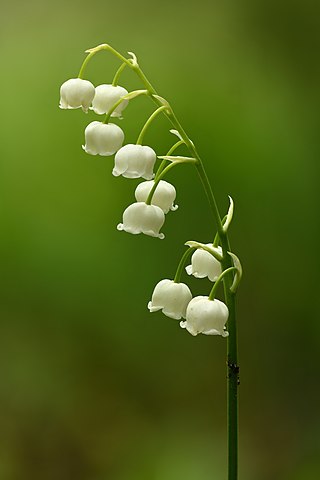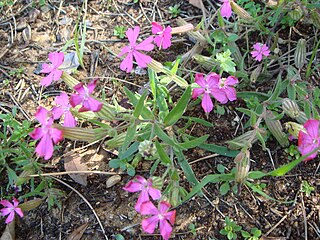
Silene is a genus of flowering plants in the family Caryophyllaceae. Containing nearly 900 species, it is the largest genus in the family. Common names include campion and catchfly. Many Silene species are widely distributed, particularly in the northern hemisphere.

Lily of the valley, sometimes written lily-of-the-valley, is a woodland flowering plant with sweetly scented, pendent, bell-shaped white flowers borne in sprays in spring. It is native throughout the cool temperate Northern Hemisphere in Asia and Europe. Convallaria majalis var. montana, also known as the American lily of the valley, is native to North America.

Silene dioica, known as red campion and red catchfly, is a herbaceous flowering plant in the family Caryophyllaceae, native to Europe and introduced to the Americas.

Anemone hepatica, the common hepatica, liverwort, liverleaf, kidneywort, or pennywort, is a species of flowering plant in the buttercup family Ranunculaceae, native to woodland in temperate regions of the Northern Hemisphere. This herbaceous perennial grows from a rhizome.

Hemipilia keiskei is a species of plant in the family Orchidaceae. The species is endemic to Japan.

Silene stenophylla is a species of flowering plant in the family Caryophyllaceae. Commonly called narrow-leafed campion, it is a species in the genus Silene. It grows in the Arctic tundra of far eastern Siberia and the mountains of northern Japan. Frozen samples, estimated via radiocarbon dating to be around 32,000 years old, were discovered in the same area as current living specimens, and in 2012, a team of scientists successfully regenerated a plant from the samples.

Rhododendron keiskei is a species of flowering plant in the heath family Ericaceae, native to Honshu, Kyushu and Shikoku in Japan.

Carex bohemica is a species of sedge, native to Europe, Siberia, and northern Asia to Japan, and it was introduced to Sweden. It prefers to grow in mud flats. It is called Zypergras-Segge in German.

Kalanchoe beauverdii is a species of flowering plant in the family Crassulaceae. It goes by the common name Beauverd's widow's-thrill.
Silene andicola is a species of flowering plant in the family Caryophyllaceae. The species is native to Argentina, Bolivia, and Chile. Plants grow on rocky slopes, outcrops, soily screes, grasslands, and open scrubs.

Silene mandonii is a species of flowering plant in the family Caryophyllaceae.

Silene supina is a species of flowering plant in the family Caryophyllaceae. It is native to the Balkans, North Caucasus, and Iran.

Silene aegyptiaca is a species of flowering plant in the family Caryophyllaceae. The common name for this species is Egyptian campion or Egyptian catchfly.

Poa cita, commonly known as the silver tussock, or wī, which is also a Māori name, or by the Māori name pātītī, is a grass of the family Poaceae that is endemic to New Zealand. Poa cita was described and named by Elizabeth Edgar in 1986, having previously being named Poa caespitosa.

Baccharis articulata is a species of shrub in the family Asteraceae.

Urceolina urceolata is a perennial plant species in the family Amaryllidaceae. The species is native to Peru.

Silene stockenii is a species of flowering plant in the Caryophyllaceae first described in 1973. The specific epithet is named after Christopher Maitland Stocken, who discovered it in 1962 in Bornos. It is native to Spain, where it is endemic to grasslands growing in calcareous soil on formations made from calcarenite west of Cádiz in Andalusia. It is currently listed as critically endangered. In 1993, the number of individuals belonging to this species was estimated to be below 2000.

Silene italica is a species of plant native to Southern Europe and parts of Asia. It is also introduced to parts of the United States and Northern Europe.
Festuca ampla is a species of grass described and named by the botanist Eduard Hackel in 1880. F. ampla often thrives in habitats that include humid environments, arid soil, and sandy areas. This species grows in temperate biomes and is a perennial. This species is native to Portugal, Spain, and Morocco.

Leucothoe keiskei, the Keskei dog hobble or Keskei fetterbush, is a species of flowering plant in the family Ericaceae, native to southern Honshu, Japan. A perennial evergreen shrub reaching 1 m (3 ft), there are a number of cultivars, including 'Royal Ruby' and 'Opstal50', trade designation Burning Love.


















